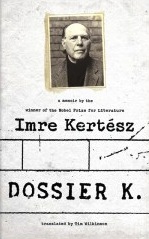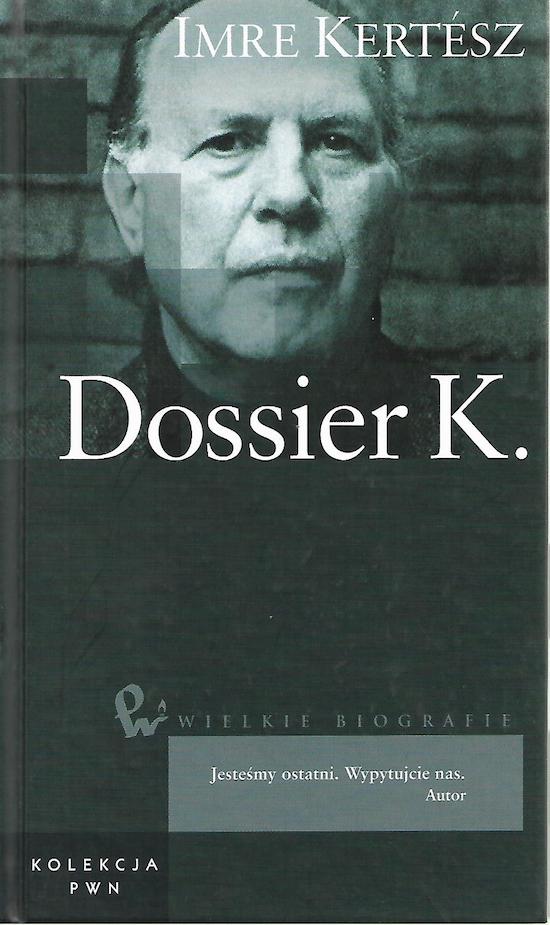‘After silence, that which comes nearest to expressing the inexpressible is music.’
– Aldous Huxley
Imre Kertész’s work, by his own admission, is always about the Holocaust (in particular Auschwitz) even when it appears not to be. His first novel Fateless is a stark and powerful fictionalisation of his own concentration camp internment. In this and his other more naturalistic works a truncated prosaic rhythm which at once captivates and horrifies pervades every page. His sparse language strips back the values which cannot have any meaning after such atrocities.
However, in those works which deal with the Holocaust more obliquely, there is a different kind of music playing, a repeatedly plucked sour note which seeps through the gaps in between the sentences and, in its very peripheral or parallel movement in relation to history, helps to reveal the inexpressible void at the centre of both his own experiences and of writing.
Kaddish for an Unborn Child is partially bookended by two declarative No’s, the first of which is a response to the enquiry of a passerby as to whether the narrator has children, the second being the one he shouts to his wife when she asks him if they can have a child. In-between is his address as to why he is unable to bring new life into such a disintegrated world. In The Pathseeker Kertész has a narrator referred to only as the Commissioner investigate an event which occurred on the outskirts of an unnamed town in an unnamed land. A distorted and smothered Weimar (and Buchenwald) lies beneath the surface of the suspicious prose. Finally, Union Jack is focused entirely around the sighting of the Union Jack flag during the 1956 Hungarian revolution, corresponding to the moment in his own life when Kertész realised he was a writer. Direct references to music and the process of writing abound, and weave a pattern through often stylistically varied material to form a tapestry which depicts the dangers of history, the personal grave for which writing is the spade and the void.
The Pathseeker’s veiled town of Weimar has tried to bury the events which occurred there in the past. However, once the commissioner turns to face it his gaze erodes the affectations of normalcy, that calm continuous chord of history, into something which sounds like it is playing from a ‘bad, scratchy old record’ that has disintegrated to a cluster of broken voices. History has silenced everything in its all-encompassing hum, buried them with its own universal entombing of the past. This is eventually undone because of the Commissioner’s personal witness, the tomb crumbles and something is revealed: not what is presented on the surface but the way things ought to be. The discordant voices of the dead can finally be heard: a doppelgänger for the concept of avant-garde writing as utopic due to its display of language as it should be rather than how it is. History then is the antonym of personal witness, of a record, the antonym of writing. The polysemic nature of the word record tying together the coexistent yet antithetical strands of the historical record as a whole, the personal records of those left behind, and the idea of remembrance, but the notion that each, in their own way, is scratched and broken, hidden but not entirely destroyed. The word’s Latin origins recordari: to remember or call to mind and cor meaning the heart further cementing the interconnections between bearing witness, writing and the broken ‘core’ at the heart of memory after the Holocaust.
These irreconcilable forces are ever-present. Union Jack’s narrator’s ability to tell his untellable story is the fact that his young self appears to him as though he were in a film (a visual recording mechanism) and later, when the ‘black limousine’ comes to take his lecturer away there is an ‘unexpected hush . . . an orchestral pause.’ In other words: silence falls. His reiterations of the impossibility of reconciling the disaster of the world of the fictional Die Walküre with the disaster of his own world strike a chord with Kaddish’s recurring mentions of the fact of Auschwitz being incongruous with its perceived impossibility further highlighting the embedded tension between fiction and reality, writing and mutely bearing witness.
In this textual space the subterranean connotations relating to concepts such as music, silence, fiction, reality are in flux; aspects of presence and absence, positivity and negation bubble underneath the words on the page. There is no simple absolute representation.
There is an inherent moral component at work here. Inevitably one runs into Adorno’s oft misused remark about the barbarism of poetry after Auschwitz. However he, importantly, qualified this statement:
One can understand that any representation is unable to convey the pain and suffering of an individual’s actual experience of the Holocaust and yet there remain, as Levi remarks: those who are silent and those who speak. Raising the question of whether sound is a betrayal of those who were silenced.
By problematising this interplay of forces and preventing the solidification of a ‘Holocaust conformism’ Kertész exposes the value of writing. Unlike speech’s constant reliance on presence, whose perpetuation creates a ‘history of silence’, writing’s reliance on absence allows it to remove, to remove personal experience from the muteness of history, to remove the presence of what is shown to reveal what’s underneath, to oscillate, shake like a string around the un-representable void, to destabilise and ask questions. To prevent the re-territorialisation of a new land where the past has disappeared, the void has been filled in by renewal and a blank empty space has been drawn over the top whilst still remaining ‘under suspicion’.
Sensory experience too is suspect, the existence of both this world and another world seem equally absurd, whether in a state of dream or wakefulness the result is the same: a disbelief in a reality which is inescapable, the complete impossibility of comprehending something which is ever present even once it has passed.
Breaking one’s silence and writing then is an act of automutilation. This finds its most explicit depiction in Kaddish for an Unborn Child where the continued non-existence of the narrator’s child is a necessary predicate for his own liquidation, he writes not for pleasure but to seek pain and the publication of one of his stories sickens him. Writing is digging, it allows the narrator to ‘play death on a sweeter string’, he does everything to avoid his writing being discussed, and any form of speech remains inadequate, he simply writes even though he knows it to be poisonous, it is an incurable disease like Auschwitz, but death he writes, echoing Cioran, will finally be a home after the exile of his existence.
Still he keeps digging.
The relationship between music and silence sings (and does not) throughout his words, reverberating over the remnants of his experiences of the Holocaust and exposing the horror of the great chasm which lurks beneath all of us and a possible reaction to this, an impossible bridge, namely the attempt to establish presence by removing oneself from the silence of history, even if that presence is a grave, a mound of earth. This is writing’s true power and which, at his best, Kertész beautifully reveals: that, despite the abhorrence of writing and the inherent distance between the formulations of literature and those of the experience being represented, by picking up the spade and writing, digging out our own personal graves, we can use these shovels of words to escape the brutality of history’s infinite silence. A space can be temporarily erected between the impossibility of art and values after such a catastrophic event, rippling the flat x-axis of the centuries releasing a howl from the pages of our own witness.

Kertész’s memoir Dossier K is available now, published by Melville House


